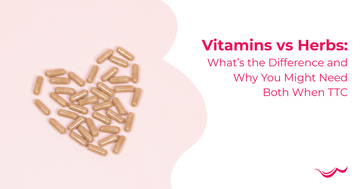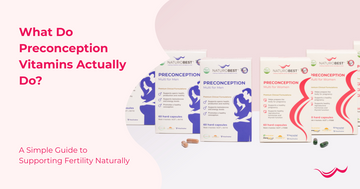10 Lifestyle Factors You Can Influence to Help Boost Male Fertility
by NaturoBest Naturopath Team on May 02, 2022

To achieve fertilisation, a man must be able to obtain and maintain an erection, produce enough sperm, ensure the sperm are well-shaped and motile, and create enough semen to carry the sperm to the egg. A problem at any point in this process can reduce the likelihood of pregnancy.
How can you improve sperm quality?
It takes 74 days to produce a completely new batch of sperm cells. During this period, sperm are particularly vulnerable to nutritional deficiencies and toxins. Research has shown that DNA damage in sperm may increase the risk of miscarriage and can even contribute to infertility.
Take a Preconception Multivitamin
Severe deficiencies in vitamins A, D, E and zinc have been linked to decreased male fertility. Nutrients such as vitamins A, C, E, D, folate, B12, co-enzyme Q10, selenium, zinc and alpha lipoic acid are known to support sperm quality.
A high-quality multivitamin, taken alongside a healthy diet, is highly recommended. Ensure the formula does not contain copper, as copper antagonises zinc, a mineral essential for optimal sperm and reproductive health. NaturoBest’s Preconception Multi for Men contains all of these key nutrients without unnecessary fillers.
Follow a Preconception Care Plan for Four Months
Following a preconception plan for at least four months is essential for a healthy conception and can influence the outcome of the pregnancy. You can learn more here.
Exercise
Studies show that regular exercise can have a positive effect on male fertility. Training programmes lasting 14 to 24 weeks have been shown to improve semen quality, which may increase the chances of pregnancy.
Positive results were seen particularly in inactive men who began exercising three times per week for around 45 minutes. Both aerobic and resistance training improved semen quality, reproductive hormones and reduced inflammation. Importantly, participating in these exercise programmes increased the likelihood of men conceiving with their partner.
Avoid Tight Underwear
Experts recommend wearing loose-fitting underwear to prevent overheating of the testes.
Test Thyroid Function
If hypothyroidism is left untreated, it can cause increasing damage to the testes. Once thought to be unresponsive to thyroid hormones, the testes are now known to be affected by thyroid dysfunction. Thyroid disorders have been associated with abnormalities in sperm morphology, impaired testicular function, reduced fertility and changes in sexual activity.
Sleep Hygiene
Sleep quality has a significant impact on fertility. According to the CDC, lack of sleep can disrupt hormones involved in reproduction. More than one third of Americans experience inadequate sleep.
The part of the brain that regulates “sleep-wake hormones” is also responsible for controlling sex hormones. This affects ovulation in women and sperm maturation in men. Managing chronic medical conditions such as high blood pressure and diabetes is also essential, as improving these factors may increase the chances of conception.
Lose Excess Weight
Studies suggest that couples in which the man is overweight or obese take longer to conceive compared with couples where both partners are a healthy weight. Research has shown that excess weight can impair sperm quality by reducing sperm count and motility and increasing DNA damage.
A 2012 study found that overweight and obese men were more likely to have low sperm counts and fewer viable sperm compared with men of a healthy weight. These effects may be due to changes in testosterone and other reproductive hormones associated with excess body fat.
Improve Nutrition
A healthy, well-planned diet is essential for supporting fertility and increasing the likelihood of conception. Nutrition plays a crucial role in hormone production and supports the health of both sperm and eggs.
Increase your intake of fresh organic fruits and vegetables. Pumpkin seeds and kale can help boost zinc and folate levels, easily added to daily smoothies or stir-fries.
Avoid Heat and Environmental Toxins
Avoid spas and saunas, placing laptops on your lap, and keeping mobile phones in pockets, as these can generate heat and affect sperm quality.
Switching to organic food can also reduce exposure to pesticides containing xenoestrogens (foreign oestrogens), which may disrupt hormone balance and impact fertility.
Final Thought
Small, consistent changes in daily habits can have a meaningful impact on male fertility. By supporting the body with key nutrients, regular exercise, quality sleep, toxin reduction and a solid preconception plan, men can significantly improve sperm health and overall reproductive wellbeing. Taking proactive steps now helps create the healthiest possible environment for conception and gives both partners the best start on their journey to parenthood.




